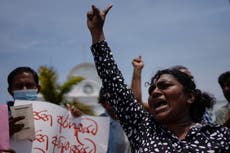Sri Lanka using emergency to harass and arrest peaceful political protesters, says Human Rights Watch
Authorities have also banned several protest leaders from travelling abroad
An international human rights group has accused the Sri Lankan government of “using emergency regulations to harass and arbitrarily detain activists seeking political reform and accountability”.
Since president Ranil Wickremesinghe took charge on 21 July, police and military have sought to curtail protests through “the intimidation, surveillance and arbitrary arrests of demonstrators, civil society activists, lawyers and journalists”, the Human Rights Watch said in a statement on Wednesday.
Security forces injured more than 50 people in an early morning raid on 22 July at the main protest site in Colombo. Local reports have said that armed troops attacked protesters with batons and beat up lawyers and journalists during the crackdown that day. Authorities also banned several protest leaders from travelling abroad.
Last week, the country’s parliament approved a state of emergency, which gives the president the power to make regulations in the interest of public security and order. The ordinance also gives police the power to police to arrest and detain individuals for long periods.
That same day, on 27 July, Sri Lankan authorities arrested Kusal Sandaruwan and Weranga Pushpika, who had helped lead the mass demonstrations that eventually ousted former president Gotabaya Rajapaksa.
They were held on the charges of unlawful assembly. A day earlier, police had arrested student leader Dhaniz Ali, who was boarding a Dubai-bound flight.
“The Sri Lankan government’s crackdown on peaceful dissent appears to be a misguided and unlawful attempt to divert attention from the need to address the country’s urgent economic crisis,” said Meenakshi Ganguly, South Asia director at Human Rights Watch.
“Sri Lanka’s international partners should be clear that they need to be working with a rights-respecting administration to address Sri Lanka’s deeply rooted economic problems.”
Ms Ganguly noted that the people of Sri Lanka “are reeling under an economic crisis” as she urged the government to end its “repressive policies and practices” and address people’s basic needs, win public trust, and uphold the rule of law by holding those responsible to account.
A crippling economic crisis forced Sri Lankans to revolt against the Rajapaksa government, which has been blamed for the cash crunch that has left the nation’s 22 million people short of fuel and food.
Since April, thousands of people took to the streets in protest, eventually forcing the entire government to step down.
The street protests intensified in July with demonstrators storming into the presidential palace in Colombo and setting the house of Mr Wickremesinghe, who was earlier the prime minister, on fire.
Mr Rajapaksa, Mr Wickremesinghe’s predecessor, was forced to flee the country last month after these protests. Mr Wickremesinghe was then elected president to finish the remainder of Mr Rajapaksa’s term, which ends in 2024.
Meanwhile, earlier on Wednesday, the president told the parliament that his government is preparing a national policy roadmap for the next 25 years that aims to cut public debt and turn the country into a competitive export economy as it seeks a way out of its worst economic disaster.
He said the government has initiated negotiations with the International Monetary Fund on a four-year rescue plan and had commenced the finalisation of a debt restructuring plan.
“We would submit this plan to the International Monetary Fund in the near future, and negotiate with the countries who provided loan assistance. Subsequently, negotiations with private creditors would also begin to arrive at a consensus,” he said.
Additional reporting by agencies
Join our commenting forum
Join thought-provoking conversations, follow other Independent readers and see their replies
Comments




Bookmark popover
Removed from bookmarks